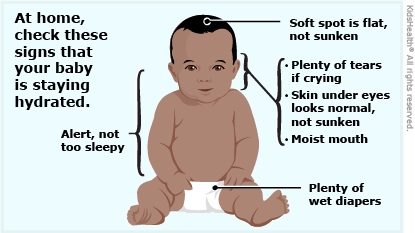Your baby was vomiting (throwing up) and stayed in the hospital for treatment and testing. The health care team gave your baby fluids (either by mouth or through an intravenous line, or IV) to replace the losses from vomiting. They also checked your baby for different causes of vomiting. Your baby is no longer vomiting and is drinking well. No serious cause of the vomiting was found. You can now care for your baby at home.



Your baby:

Your baby:
You know your baby best. If your baby seems very sick or has symptoms that worry you, call your health care provider or take your baby to the ER.

Why do babies vomit? Vomiting usually happens in babies from an infection caused by a virus (a type of germ). The infection may also cause diarrhea and fever. Vomiting also can happen from formula or food allergies, gastroesophageal reflux (when liquids from the stomach flow backward up into the mouth), or, very rarely, a blockage in the intestines.
Is spitting up the same as vomiting? No. Spitting up happens when there is an easy flow of liquid out of a baby's mouth, often with a burp. Spitting up doesn't cause discomfort. Vomiting happens when a baby throws up liquid or solids forcefully. Vomiting is uncomfortable and often happens a few times.